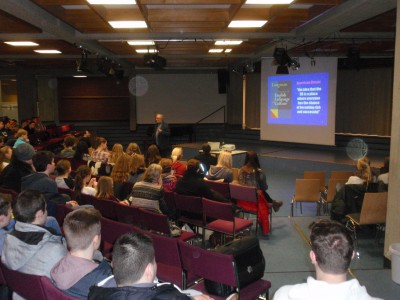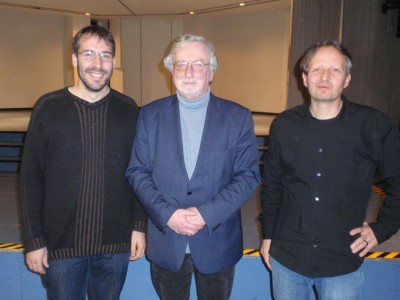 Even though the American Dream is one of the obligatory subjects in most federal states at school, just as it is in North Rhine-Westphalia, saying what is meant by the term “American Dream”, explaining and defining what this dream is really about, is still met by many difficulties.
Even though the American Dream is one of the obligatory subjects in most federal states at school, just as it is in North Rhine-Westphalia, saying what is meant by the term “American Dream”, explaining and defining what this dream is really about, is still met by many difficulties.
In order to give us, the Englischleistungskurse of year eleven and twelve accompanied by some English teachers, a better understanding of the American Dream and the problems which occur when trying to define this term, Prof. Dr. Freese conducted a compelling presentation on 18th December, 2014 in the Aula.
After having been introduced as one of the most significant figures of American studies in Germany, the already retired university professor Freese from the University of Paderborn began his presentation by saying that there is no one who really knows what the American Dream is and made clear that this dream is not only a question of material wealth – after having presented several definitions from various encyclopedias – and that the dream of turning “from rags to riches” is mainly present in the heads of immigrants coming to the U.S.A.. Still, the idea of the American Dream differs among ethnic groups from Japan to Cuba, as Freese explained later on.
Although the term “American Dream” was already coined back in 1931, the dream is not only part of the U.S.A.’s history, but also a part of today’s art, literature, politics and music. Thus, it is necessary to understand the dream in order to understand the U.S.A. .
The American Dream has always been part of American politics from the Clintons, to Mr. George W. Bush and the Obamas. All of them have their own idea of the American Dream and how to “save” this dream, which already reveals why it is hard to find one appropriate definition for the term as all of them think differently about this dream. However, the best examples to illustrate which ideas are connected to this dream are Bush’s and the Obamas’ interpretation of the American Dream.
While Bush believed that the American Dream was a synonym for owning a house, he tried to help the less fortunate third of America’s population without own residential property by introducing the “American Dream Down-payment Initiative”. Despite the fact that this initiative allowed many Americans – at least temporary – to enjoy living in their own houses, the consequences were more of a nightmare than a dream. Millions of people got kicked out of their homes which they had just acquired, additionally to this these people still had debts to be paid off and as a consequence of these events a world economic crisis got triggered.
In contrast to Bush, the more recent examples for the idea of the American Dream might be presented by the Obamas, as only 17 % of the American population believes that having one’s own house is the most important aim in life. Barack Obama is often presented as being the impersonated American Dream due to the fact that although he grew up in a ghetto he achieved success and got elected into the White House by pursuing his own dreams and working hard. He accomplished to climb the social ladder, to turn from “rags to riches”. Still, to Obama himself the American Dream is not only about the individual’s success, but about a collaborative American community, adding an individual aspect to his definition of the American Dream, again showing that finding one definition for all is not possible.
As mentioned, it is not only literature or politics which deal with the idea of the American Dream but also music, as Freese explained. By playing several songs by musicians such as Bruce Springsteen, System of a Down, Bad Religion, Madonna, Tracy Chapman, Casting Crowns and Frank Zappa’s provocative “Bobby Brown”, Freese created an even more entertaining atmosphere, and also illustrated that the American Dream is not only dealt with in one particular kind of music, but is part of all music genres and that the American Dream has always been discussed in different ways in music. Furthermore, Freese named some well-known musicals and operas in which the American Dream is discussed, such as West Side Story.
Freese does not believe that the American Dream can be really defined – as everyone has their own idea of this dream – which he made clear by presenting us the different points of view on this dream of various ethnic groups, politicians and artists he still named us what he believed to be the ingredients of the dream. According to Freese, the ingredients are the belief in positive progress, the conviction that everybody can reach their aims by their own efforts, the belief that God has singled out America as the chosen country by constantly challenging frontiers (not only geographically speaking, but also social frontiers), the ideas of liberty and equality and the melting pot. However, Freese pointed out that the idea of a melting pot is probably too idealistic, as there cannot be found any real example of one.
 Despite the fact that Freese only had 90 minutes to present the American Dream, he was able to spell out many aspects of this term precisely: That the idea of the American Dream is not only interpreted differently by individuals, but also by whole ethnic groups was something that I personally did not know, but find important to know in order to understand this dream. To me the American Dream was always more about the material aspect, more about climbing the social ladder, but I have learned that this is not everything that is meant by the term American Dream. The American Dream can also be the dream of liberty or having a family, something that I had not taken into account before. For his enjoyable and informative presentation we would like to thank Prof. Dr. Freese.
Despite the fact that Freese only had 90 minutes to present the American Dream, he was able to spell out many aspects of this term precisely: That the idea of the American Dream is not only interpreted differently by individuals, but also by whole ethnic groups was something that I personally did not know, but find important to know in order to understand this dream. To me the American Dream was always more about the material aspect, more about climbing the social ladder, but I have learned that this is not everything that is meant by the term American Dream. The American Dream can also be the dream of liberty or having a family, something that I had not taken into account before. For his enjoyable and informative presentation we would like to thank Prof. Dr. Freese.
(Stufe 12 E-Lk Srd)
